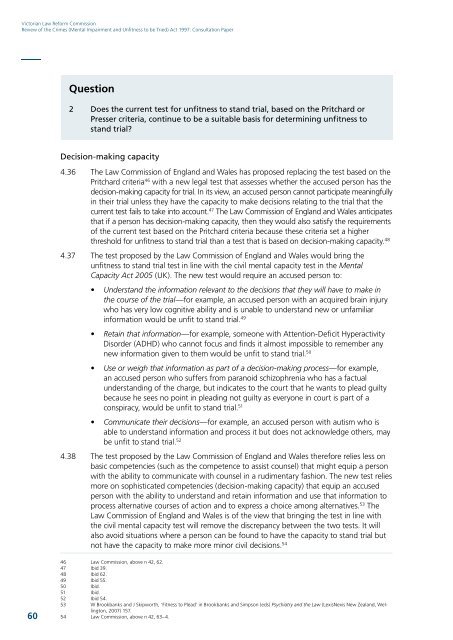Crimes Mental Impairment consultation paper.pdf - Victorian Law ...
Crimes Mental Impairment consultation paper.pdf - Victorian Law ...
Crimes Mental Impairment consultation paper.pdf - Victorian Law ...
Create successful ePaper yourself
Turn your PDF publications into a flip-book with our unique Google optimized e-Paper software.
<strong>Victorian</strong> <strong>Law</strong> Reform Commission<br />
Review of the <strong>Crimes</strong> (<strong>Mental</strong> <strong>Impairment</strong> and Unfitness to be Tried) Act 1997: Consultation Paper<br />
Question<br />
2 Does the current test for unfitness to stand trial, based on the Pritchard or<br />
Presser criteria, continue to be a suitable basis for determining unfitness to<br />
stand trial<br />
Decision-making capacity<br />
4.36 The <strong>Law</strong> Commission of England and Wales has proposed replacing the test based on the<br />
Pritchard criteria 46 with a new legal test that assesses whether the accused person has the<br />
decision-making capacity for trial. In its view, an accused person cannot participate meaningfully<br />
in their trial unless they have the capacity to make decisions relating to the trial that the<br />
current test fails to take into account. 47 The <strong>Law</strong> Commission of England and Wales anticipates<br />
that if a person has decision-making capacity, then they would also satisfy the requirements<br />
of the current test based on the Pritchard criteria because these criteria set a higher<br />
threshold for unfitness to stand trial than a test that is based on decision-making capacity. 48<br />
4.37 The test proposed by the <strong>Law</strong> Commission of England and Wales would bring the<br />
unfitness to stand trial test in line with the civil mental capacity test in the <strong>Mental</strong><br />
Capacity Act 2005 (UK). The new test would require an accused person to:<br />
• Understand the information relevant to the decisions that they will have to make in<br />
the course of the trial—for example, an accused person with an acquired brain injury<br />
who has very low cognitive ability and is unable to understand new or unfamiliar<br />
information would be unfit to stand trial. 49<br />
• Retain that information—for example, someone with Attention-Deficit Hyperactivity<br />
Disorder (ADHD) who cannot focus and finds it almost impossible to remember any<br />
new information given to them would be unfit to stand trial. 50<br />
• Use or weigh that information as part of a decision-making process—for example,<br />
an accused person who suffers from paranoid schizophrenia who has a factual<br />
understanding of the charge, but indicates to the court that he wants to plead guilty<br />
because he sees no point in pleading not guilty as everyone in court is part of a<br />
conspiracy, would be unfit to stand trial. 51<br />
• Communicate their decisions—for example, an accused person with autism who is<br />
able to understand information and process it but does not acknowledge others, may<br />
be unfit to stand trial. 52<br />
4.38 The test proposed by the <strong>Law</strong> Commission of England and Wales therefore relies less on<br />
basic competencies (such as the competence to assist counsel) that might equip a person<br />
with the ability to communicate with counsel in a rudimentary fashion. The new test relies<br />
more on sophisticated competencies (decision-making capacity) that equip an accused<br />
person with the ability to understand and retain information and use that information to<br />
process alternative courses of action and to express a choice among alternatives. 53 The<br />
<strong>Law</strong> Commission of England and Wales is of the view that bringing the test in line with<br />
the civil mental capacity test will remove the discrepancy between the two tests. It will<br />
also avoid situations where a person can be found to have the capacity to stand trial but<br />
not have the capacity to make more minor civil decisions. 54<br />
60<br />
46 <strong>Law</strong> Commission, above n 42, 62.<br />
47 Ibid 39.<br />
48 Ibid 62.<br />
49 Ibid 55.<br />
50 Ibid.<br />
51 Ibid.<br />
52 Ibid 54.<br />
53 W Brookbanks and J Skipworth, ‘Fitness to Plead’ in Brookbanks and Simpson (eds) Psychiatry and the <strong>Law</strong> (LexisNexis New Zealand, Wellington,<br />
2007) 157.<br />
54 <strong>Law</strong> Commission, above n 42, 63–4.

















